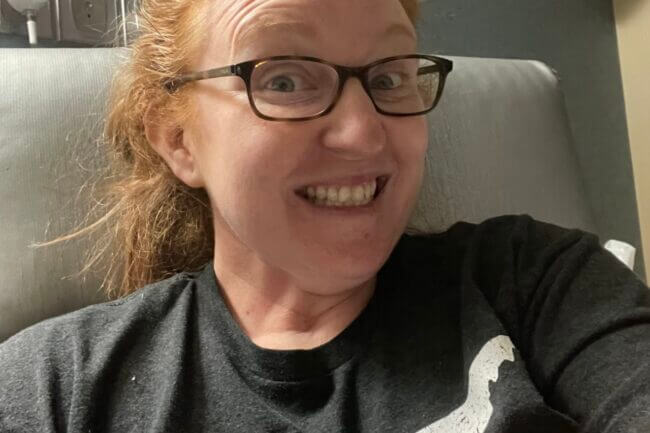In light of Colorectal Cancer Awareness month, we’ve partnered with to the Colon Cancer Coalition to tell you Christina’s story. Christina is a colorectal cancer survivor and advocate. Her story below.
When Christina was 36, she’d been experiencing blood in her stool, bloating, pain, constipation, and diarrhea off-and-on for 18 months. Because of her age, these symptoms had been dismissed by countless doctors. She finally found a nurse practitioner who listened to her concerns and referred her to a gastroenterologist. Treatment for her symptoms led to a colonoscopy and ultimately a colorectal cancer diagnosis. Because Christina was persistent and didn’t let her symptoms be dismissed, her cancer was discovered at stage I when it was easiest to treat, requiring only surgery.
Colorectal cancer is on the rise in young adults like Christina. By 2030, it is estimated colorectal cancer will be the leading cause of cancer-related deaths in adults 20 to 49.¹ While rates have been declining in adults over 50, mainly because of increased screening, colorectal cancer rates in adults under 50 have been rising.² In fact, adults born in the 1990s have twice the risk for colon and four-times the risk for rectal cancer than people born in the 1950s.³
"By 2030, it is estimated colorectal cancer will be the leading cause of cancer-related deaths in adults 20 to 49."
But age is still a significant risk factor for colorectal cancer, and a personal or family history of colon or rectal cancer or colon polyps can increase your risk of developing colon cancer. One in 24 Americans will be diagnosed in their lifetime. That’s why it’s so important to understand the signs and symptoms of the disease and get screened on time with a colonoscopy or other screening test, including several noninvasive tests that can be done in the privacy of your own home.
Christina showed several signs of colorectal cancer before she was finally diagnosed. It is important to remember that many of these symptoms can point to many different ailments. These symptoms won’t always mean that you have a serious condition such as colorectal cancer. And unlike Christina, often colorectal cancer doesn’t show symptoms until the later stages of disease.
Watch for any of these symptoms, and contact your provider if you experience more than one, or any single symptom for two weeks or more.
- Blood in your stool and/or bleeding from the rectum
- Change in bowel habits or blood in the toilet
- Unexplained Fatigue or Weakness
- Anemia
- Unexplained or Unintentional Weight Loss
- Persistent Stomach Cramps or Low Back Pain
- Feeling Bloated
But age is still a significant risk factor for colorectal cancer, and a personal or family history of colon or rectal cancer or colon polyps can increase your risk of developing colon cancer. One in 24 Americans will be diagnosed in their lifetime. That’s why it’s so important to understand the signs and symptoms of the disease and get screened on time with a colonoscopy or other screening test, including several noninvasive tests that can be done in the privacy of your own home.
Christina showed several signs of colorectal cancer before she was finally diagnosed. It is important to remember that many of these symptoms can point to many different ailments. These symptoms won’t always mean that you have a serious condition such as colorectal cancer. And unlike Christina, often colorectal cancer doesn’t show symptoms until the later stages of disease.
Watch for any of these symptoms, and contact your provider if you experience more than one, or any single symptom for two weeks or more.
- Blood in your stool and/or bleeding from the rectum
- Change in bowel habits or blood in the toilet
- Unexplained Fatigue or Weakness
- Anemia
- Unexplained or Unintentional Weight Loss
- Persistent Stomach Cramps or Low Back Pain
- Feeling Bloated
_______________________________________________________________
¹Rahib, L., et al. “Estimated Projection of US Cancer Incidence and Death to 2040.” JAMA Netw Open, 7 April 2021, https://jamanetwork.com/journals/jamanetworkopen/fullarticle/2778204. Accessed 23 2 2023.
²Done JZ, Fang SH. Young-onset colorectal cancer: A review. World J Gastrointest Oncol. 2021 Aug 15;13(8):856-866. doi: 10.4251/wjgo.v13.i8.856. PMID: 34457191; PMCID: PMC8371519
³Siegel, R.L., Miller, K.D., Goding Sauer, A., Fedewa, S.A., Butterly, L.F., Anderson, J.C., Cercek, A., Smith, R.A. and Jemal, A. (2020), Colorectal cancer statistics, 2020. CA A Cancer J Clin, 70: 145-164. https://doi.org/10.3322/caac.21601
Inhale. We've got this. Exhale.
Understanding healthcare; with us, it’s personal.



